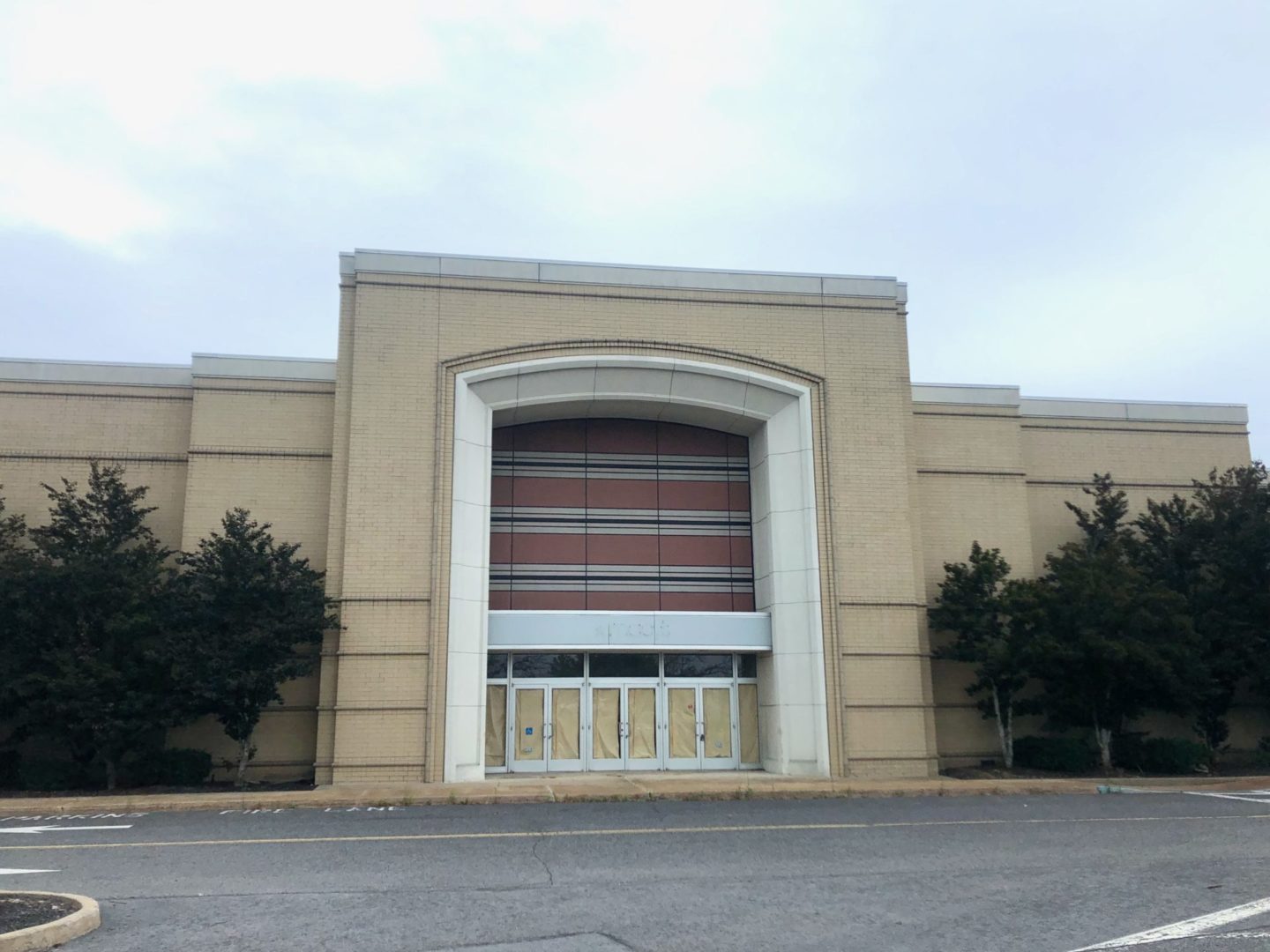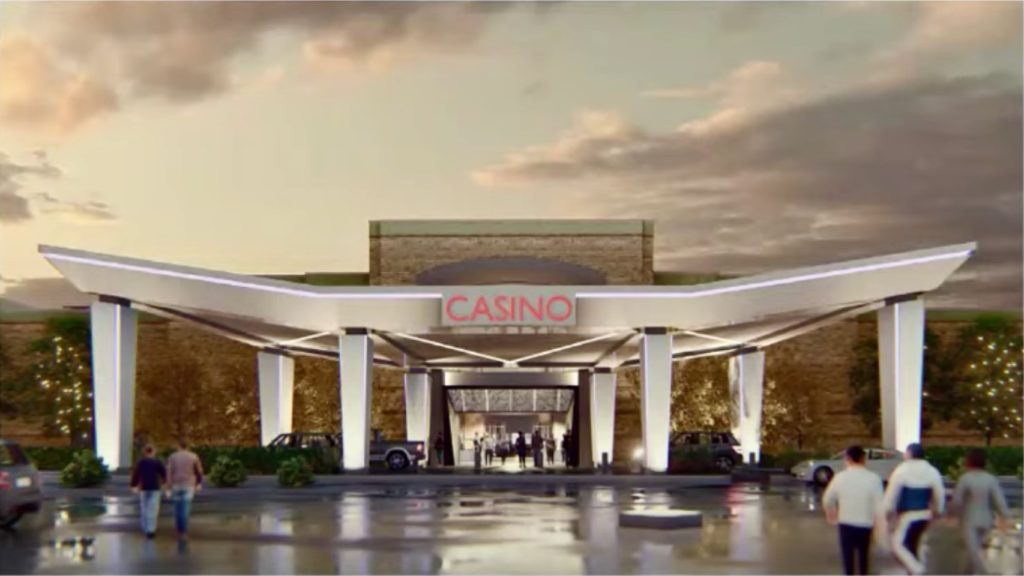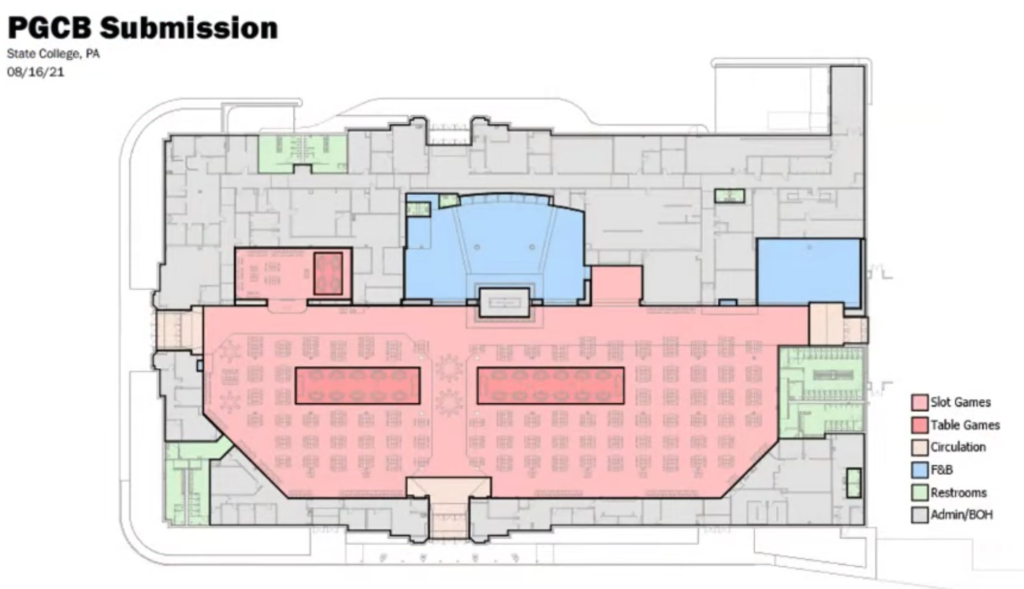
The former Macy's location at the Nittany Mall is the site of a proposed casino. Photo by Geoff Rushton | StateCollege.com

The former Macy's location at the Nittany Mall is the site of a proposed casino. Photo by Geoff Rushton | StateCollege.com
A Category 4 mini-casino proposed for the former Macy’s location at the Nittany Mall was met with support by nearly all who spoke at a Pennsylvania Gaming Control Board public input hearing held Monday afternoon at the Penn Stater Hotel and Conference Center.
Of the 49 written comments submitted in advance of the meeting, however, 27 opposed the casino.
The PGCB next will hold a public meeting on a date to be determined in Harrisburg, where the developer will make a full presentation and the board will vote on whether to grant the license for the casino.
Investor and former Penn State trustee Ira Lubert had a winning bid of $10 million at a September 2020 auction for a new license for a Category 4 casino that would be located in Centre County. In January, Bally’s Corporation announced it had signed an agreement with Lubert to develop the planned $123 million mini-casino. In March, SC Gaming Op Co., LLC, the entity formed by Lubert to develop the casino, submitted an application and local impact report that identified the 94,000-square-foot anchor spot at the College Township mall as its location.
In the application to the PGCB, SC Gaming Op Co. lists Lubert — who is based in the Philadelphia area but owns a home and businesses in State College — as the company’s president and Ara Kervandjian, Robert Poole and Richard Sokolov as vice presidents. Kervandjian and Poole are prolific Centre County developers. Sokolov is vice chairman of retail real estate company Simon Property Group and a prominent Penn State benefactor.
Monday’s meeting opened with an overview of the casino proposal — much of it already made public, but with a few new details — by Lubert, prospective CEO and general manager Eric Pearson and attorney Adrian King.
Lubert was the lead partner in the group that developed and operated Valley Forge Casino Resort before it was acquired by Boyd Gaming Corporation in 2018.
“Once again, I see an opportunity for the commonwealth and a local community in need of additional economic engines,” Lubert said. “As we’ve all seen, brick-and-mortar retail shopping has taken its lumps in recent years as internet-driven retail commerce has skyrocketed… shopping malls in particular have been hit hard, and this includes the Nittany Mall.
“I believe the Category 4 casino I intend to construct at the Nittany Mall will reinvigorate the property and draw many new businesses to the mall itself and the surrounding area. This, in turn, will create jobs and help drive the region’s economy forward, and with Penn State’s immense alumni base and other visitors flooding into the area throughout the year, not just football season, we will provide a new entertainment venue that everyone can enjoy.”
The casino would have 750 slot machines, 30 table games and sports betting along with a restaurant and bar and a multi-outlet quick-serve food and beverage area.
Pearson, who was formerly CEO at Valley Forge Casino, said the 5,000-square-foot restaurant will be sports themed and will have space for live entertainment, accommodating “smaller acts,” such as DJs or stand-up comics.
“It’s not a major concert hall but we want to be able to do what we can to be able to provide live entertainment,” Pearson said.

Addressing responsible gaming, Pearson said all casino employees are required to undergo annual training; the responsible gaming phone number (1-800 GAMBLER) and associated messaging will be on all marketing and advertising materials on and off property; and pamphlets and supporting literature will be available at “numerous” visible locations throughout the casino.
King said the property will have 24-hour security, including ongoing patrols and surveillance of the parking lot.
Responding to a PGCB commissioner’s question about underage people attempting to access the casino, given the proximity to Penn State, King cited the developers’ experience at Valley Forge.
“Having had the experience of developing and running, very successfully ,the Valley Forge casino [we are] very familiar with underage gaming issues and we will be tackling that issue as we always have in the past and will in the future with obviously great enthusiasm and everything we need to do,” King said. “Because the last thing we want to do is appear in front of you and be in a bad place.”
A local impact study by Econsult Solutions Inc. consulted with township and Centre Region officials and projected negligible impact on police, fire and EMS and road, sewer and water infrastructure.
A traffic impact study found no changes would be needed to points of entry to the mall property or road infrastructure, Pearson said.
Development and construction are projected to create in the short-term 350 direct full-time equivalent jobs and 170 indirect jobs, with a net one-time economic impact of $43.6 million for College Township and $61.4 million for the county.
The casino is expected to employ 350 to 400 full-time equivalent positions, offering a “very competitive compensation and benefits package,” Pearson said.
The report projects $121.6 million in direct and indirect annual economic impact within the township economy. In Centre County, the study estimates $164 million annual economic impact, supporting 740 jobs.
Host municipalities and counties receive 2% of a casino’s slot machine revenue and 1% of table game and sports book revenues. The impact study estimates the gaming revenues and taxes would yield $1.6 million for College Township in the first year of operation and $2 million at stabilization.

Eric Bernier, College Township Council chair, said the township supports the casino to aid in the Nittany Mall’s revival and development of the Dale Summit area, which the township has sought to foster over the past several years through zoning changes and small area planning. But, he added, the support is not for the financial benefit of the municipality.
“College Township has not hitched its wagon to this casino application,” Bernier said. “The township is in excellent financial shape and will do just fine with or without a casino.”
When Pennsylvania rolled out Category 4 casino licensing in 2017, College Township was one of only a few Centre County municipalities not to opt out for consideration as a location. The township’s commercial zoning district had previously been modified to allow for gaming in a small area that includes part of the Nittany Mall.
“Council saw this as a property-specific opportunity for a property-specific challenge,” Bernier said.
Township staff and council members traveled in March to Hempfield Township, where a mini-casino opened in a former Bon-Ton location at the Greensburg Mall. There they spoke to Hempfield officials and mall and casino staff while touring the facility.
“Just as the economic impact study has documented, this gaming use is easily accommodated into the townships existing infrastructure in that area and based on what we learned in Greensburg could serve us well as a complementary piece to the efforts that are already underway in the [Dale Summit] area,” Bernier said, noting the construction of a new Aldi grocery on Benner Pike, the planned redevelopment of the former Centre Daily Times building by Stuckey Mitsubishi and the recent additions of Rural King and Gabe’s as anchor tenants at the mall.
State Sen. Jake Corman, R-Benner Township, whose 34th District includes all of Centre County, spoke in favor of the casino, as did Mark Long, district manager for state Rep. Kerry Benninghoff, R-Bellefonte, whose 171st District includes College Township.
Corman said when Pennsylvania’s Gaming Act passed in 2003 to pave the way for casinos in the commonwealth, he opposed it.
“As it’s gone on, it’s hard to imagine we could call it anything but a success story,” Corman said. “… The fact that we have a highly regulated, highly taxed gaming industry in Pennsylvania, a lot of the things I was fearful of in 2003, whether it be an increase in crime, increase in people losing their homes, divorces, things of that nature, all the things we were concerned about socially in 2003 didn’t materialize.”
He added that the casino leadership’s local ties will benefit the community.
“When you are local, you live here, you’re raising families here, you want something nice here,” he said. “You’re not just going to be a corporate citizen that’s just going to build something and leave and not really care how it operates. They’ll have a tremendous amount of care in how this operates and that’s good for our community to have that local team as a part of it.”
Long cited the jobs, tourism and downstream economic impacts among reasons for Benninghoff’s support.
“This major investment by the developer would create a strong anchor tenant for [the Nittany Mall] which would in turn serve as a significant catalyst for economic growth as this mall transforms its purpose,” Long said.
Nittany Mall general manager Polly Welch said that with the downturn faced by malls resulting from online shopping and exacerbated by the pandemic, “the casino gives us an opportunity to think in a different way.” About 10 years ago, the mall was near full capacity, while today it’s at about 50%.
The mere prospect of the casino has roused interest from prospective tenants, Welch said.
“With just the hope that something like this comes in to play, I’ve had numerous phone calls from people who are interested in leasing, be it retail, restaurant, a multitude of different things, and this is just with an idea or a hope,” she said. “So I can only imagine that once it’s up and running and everything is good that that will help revitalize the Nittany Mall.”
Leaders of the local business community voiced support for the casino as well, including the Chamber of Business and Industry of Centre County and the Happy Valley Adventure Bureau, the county’s official tourism promotion agency.
The casino will help HVAB in its efforts to promote the region to leisure and business travelers looking for a destination with a variety of engaging activities, Dave Gerdes, vice president of sales and marketing, said.
He added that the HVAB board, which supported the casino in part because of “expressed desire to be a valuable part of this community for years to come,” recognized the venue will not appeal to everyone.
“However, we do believe that a professionally and responsibly managed mini-casino will provide greater job opportunities to our regional workforce, strengthen the local tax base, help revitalize the Nittany Mall, potentially attract new entertainment options to the area and enhance efforts to grow visitation and visitor spending generating positive impacts for the entire community,” Gerdes said.
Wade Baumgartner, of Carpenters Local #423, called the casino “a tremendous opportunity for the area,” and noted the job opportunities during construction for some of the approximately 1,300 carpenters represented by the union.
John Delozier, managing partner for Nittany Hotel Management, which operates the nearby Best Western Plus on Shiloh Road, said the casino will further growth in the Dale Summit area and aid a hospitality industry struggling with the impacts of COVID-19.
“This proposed casino will certainly be a major contributor to our recovery as a hospitality industry and as a community,” he said.
Bellefonte resident Carl Miller was the lone speaker who fully opposed the casino. After citing his work with various organizations dedicated to helping the underprivileged, he said he believes the casino will have a negative effect on those who are already struggling and quality of life in the community.
“There are more poor people in Centre County than most citizens recognize,” Miller said. “A casino will not provide sustenance for the poor, underemployed and desperate. On the contrary, casino gambling entices the poor to risk an already inadequate means of support on an exceedingly slim chance of financial gain.”
College Township resident Pat Vernon supported the casino, suggesting to the developers that they expand the restaurant and entertainment area. He also said he believes parking near the property will not be sufficient and urged them to consider a parking deck.
Carl Hill, a Benner Township resident and retired United Methodist pastor, said he had mixed feelings. He opened by quoting the UMC’s position on gambling as “a menace to society, deadly to the best interests of moral, social, economic, and spiritual life, destructive of good government and good stewardship.”
He also said he had questions about parking and financial impact, but stopped short of saying he opposed the casino.
“I don’t want to be a hypocrite and pretend I’ve never been in a casino,” Hill said. “I have been. I’ve won a couple dollars. I have mixed emotions and I appreciate what I’ve heard from both sides.”
Once license and permit approvals are granted, construction of the casino is expected to take about one year.
College Township Planning Commission is scheduled to review land development plans for the casino during its meeting at 7 p.m. on Tuesday.
Receive all the latest news and events right to your inbox.

80% of consumers turn to directories with reviews to find a local business.